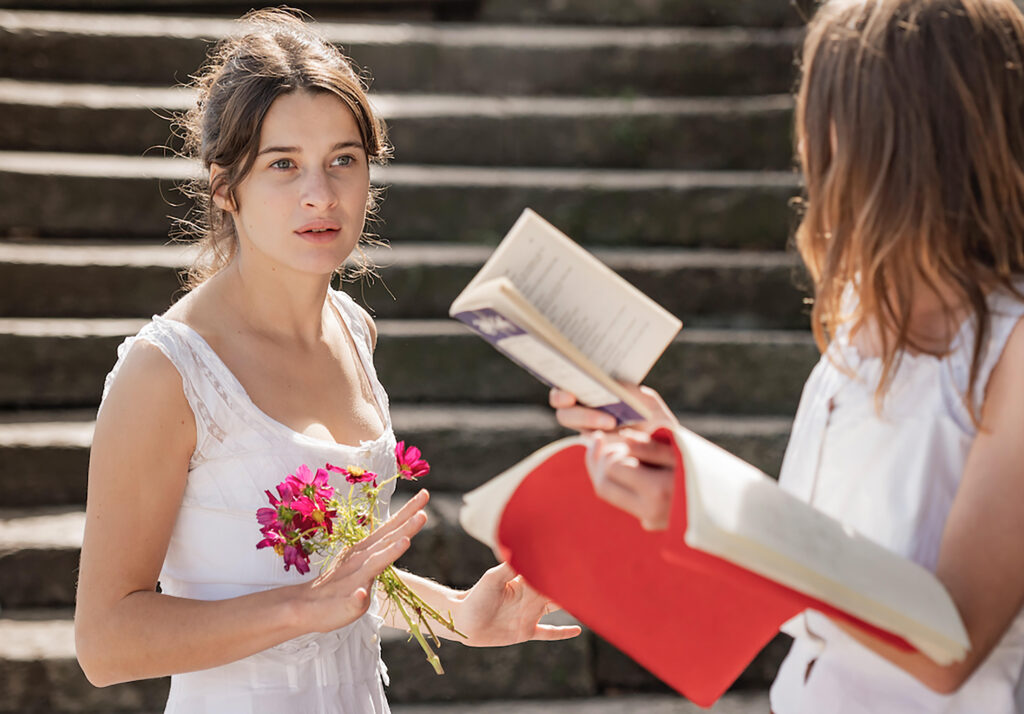Sandrine Kiberlain is a French actress and singer. She received the César for Best Actress for her role in “9-Month Stretch.” The short film “Smile” was her first film as a director. “A Radiant Girl” marks her feature directorial debut.
“A Radiant Girl” is screening in Critics’ Week at the 2021 Cannes Film Festival. The fest is taking place July 6-17.
W&H: Describe the film for us in your own words.
SK: I wanted to film the vital momentum of a 19-year-old heroine, Irene, in stark contrast with one of the greatest injustices of history, the Holocaust. I wanted to present this young French Jewish girl and her family — less threatened than the foreign Jews at the time — to modern audiences, as well as imagine their daily lives before 1942 became the horror we know.
W&H: What drew you to this story?
SK: I tried to film this period through the prism and to the rhythm of Irene, who does not want to see the reality she is perceiving. I wanted to portray the ardor of her age that reminds me of my own acting debut at 19, a sort of rebirth that could be stopped only by unexpected tragedy.
I wanted to depict the greatest joy, and show it stabbed by the unprecedented. I often think of this sentence from Hélène Berr’s diary, “The weather is always nice on a day of disaster.”
W&H: What do you want people to think about after they watch the film?
SK: I want “A Radiant Girl” to remain modest, a gesture to never forget. The deliberate timelessness of the film’s form could perhaps even be sobering. “1942 was yesterday,” such a mad idea, is still debated today, and without vigilance 1942 could indeed happen again.
W&H: What was the biggest challenge in making the film?
SK: The challenge I gave myself was to talk about the war without showing it. Feel the monster lurking in the shadows without seeing it.
W&H: How did you get your film funded? Share some insights into how you got the film made.
SK: I knew my first film shouldn’t be expensive, in the interest of avoiding the high-stake pressures of a debut feature. A reasonable budget also helped with the form I wanted, so it’s not out of spite that the film remained modest.
We thought about it from the start with my producer. We asked for Ad Vitam, which I dreamed of as a distributor, then the television channels France 3 and Canal+ quickly gave their agreements. Then the Île-de-France region believed in the film too. BNP Paribas also helps certain first films after commission and after its support, Soficas responded.
It was a battle. You have to convince with history. You have to share your point of view, first to the producer, who afterwards fights with everyone to help my film exist. I am extremely grateful to those involved.
W&H: What inspired you to become a filmmaker?
SK: The need to tell this story, to film my point of view. The urge to speak up after saying other people’s words for a long time as an actress. It was vital for me to write and film this story.
W&H: What’s the best and worst advice you’ve received?
SK: The best advice: Every day you make a little movie. Don’t think beyond D-Day, otherwise it can be too dizzying. Each sequence has a stake and requires a point of view.
I forgot the worst advice. I didn’t listen.
W&H: What advice do you have for other women directors?
SK: Never let go of your story. Read it again. Always think about what you want to say, and how. Listen to others, but only listen to yourself at the end of the day.
W&H: Name your favorite woman-directed film and why.
SK: Jane Campion’s “The Piano” overwhelmed me, as much for the form as for the content. Her freedom moved me.
W&H: How are you adjusting to life during the COVID-19 pandemic? Are you keeping creative, and if so, how?
SK: Real strength is being able to adapt as much as possible to everything.
I am certainly not the person who should be pitied most. I try to use every means possible to come to ends. We were isolated. I worked. I pondered. I doubted. I refused to fear. Fear annihilates everything. I stayed as connected to others as possible.
W&H: The film industry has a long history of underrepresenting people of color onscreen and behind the scenes and reinforcing — and creating — negative stereotypes. What actions do you think need to be taken to make Hollywood and/or the doc world more inclusive?
SK: We are all equal. Unique. My film is about the madness of intolerance, one we must overcome. Write for everyone. Tell stories. Never give in to the madness that tends to exclude some folks for no reason.







